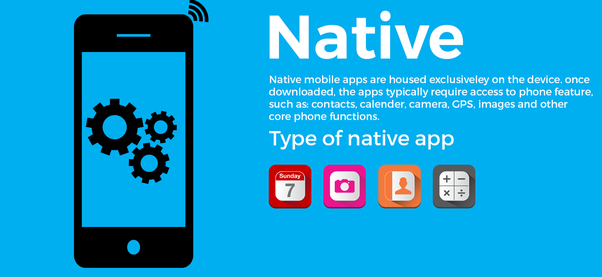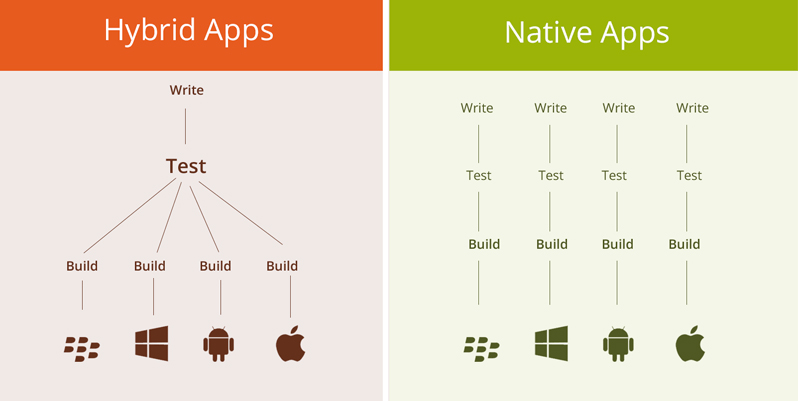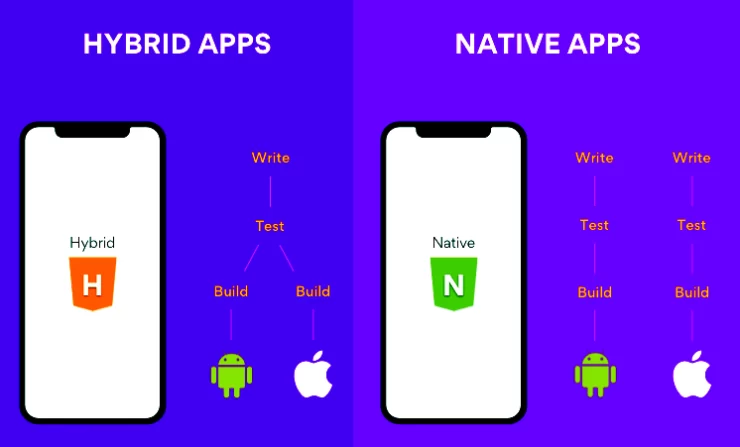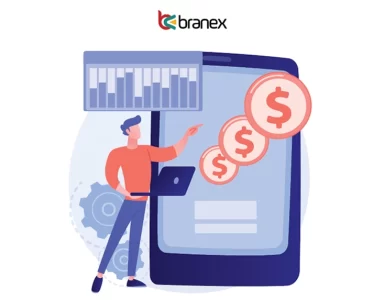If you’ve got novel mobile application ideas and are looking to hire mobile app developers to realize your dream, you’ll come to a point where you’ll be unclear about which platform to use when you build a mobile app for a client.
Hybrid vs Native Mobile App
Which one is the right choice?
As a skilled developer, I’ve worked on both platforms, which is why I can give away information which can help you decide between a native vs a hybrid app.
Let me first tell you that there is no black & white answer.
Since there are dozens of scenarios out there, the following tips will only help you analyze and decide which platform will be best suited for a situation.
First, let me explain the basic difference between a Native and a Hybrid app.
Native mobile apps are developed for a specific operating system.
Therefore, there are certain guidelines to be followed while developing apps on native to provide a better user experience.
In the native mobile app, it is faster and easier to navigate the app.
Accessing basic components like GPS, camera, and contact list is easier in the native mobile app.
On the other hand, hybrid apps are built in the same manner as native apps. But they’re built on the web using HTML5 and JavaScript.
Since hybrid apps are written in one programming language they can work on multiple platforms.
Few Negatives of Native Mobile App
The biggest disadvantage of developing apps on the native platform is that you can only build apps on the native platform for one platform. This means if you’re developing an app for Android it will only run on an Android device. If you’re developing an app on iOS, it will only run on an iOS device.
So, if you want your audience to be able to get the best experience then you’ll have to build your app as per the OS’s development guidelines.

This means that for each platform you’ll have to build a separate app, thereby requiring twice the time & resources.
Don’t freak out. Yes. This is the truth.
Everything from time, energy, resources, and even the development cost will be doubled.
Award-winning app development & design.
If you’re forced to decide between one of the two platforms, it could make or break the success of your or your client’s business.
Developing an app on a single platform can drastically affect the reach of your target audience which in the end will impact your customer acquisition cost.
To minimize the risk, you need to do extensive market research and find out which of the platforms will be right for your target audience.
Maintaining a native app is a difficult process.
Just launching the app is work half done.
The real challenge with a native app is maintaining the app.
If the app is not regularly maintained, users will simply switch the app and move to a new app.
Related Blog: How much will it cost to build a mobile app?
Of course, it will take a lot of time. The same thing goes with native app maintenance.
Positives of Hybrid App
While there are some pitfalls in Hybrid apps, there are some benefits over native apps which makes the Hybrid app the right choice in some instances.
First and foremost, it can run on more than one operating system.

This means you don’t need to build your app twice. Just make an app and it will run on both Android and Apple stores.
Hybrid apps are quick to code and test.
The apps which are built on the hybrid platform are easy to test on various versions of the app.
Because the coding is simple, you can easily alter the design elements and test the user experience in the beta version.
The simplicity of the code makes it easy to update, fix bugs, or even update the app without updating it twice for two platforms.
If you want to build a hybrid app you don’t need to learn anything new. You can build an app with the existing codes.
The best advantage of a native vs hybrid app is that a hybrid app will cost you just a fraction of what a native app will cost.
Of course, this is not an investment which can be a huge burden for big-size corporations, but medium-sized companies and startups can feel its impact on their wallets.
Which is the Best Option for You?
In the end, the decision is completely yours.
If you’re building an app for one platform, a native app is the best choice for you.
If you want to build your app quickly try Hybrid app development.
Your decision will vary according to your client or your company. Whatever you do, before developing an app, do consider these points.
An independent design and development agency with offices in the US, Canada & UAE. We create beautiful apps people love to use. Let’s connect!




